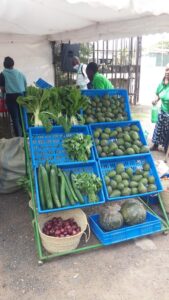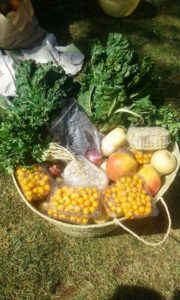
Organic farming is not just a frontier in terms of returns on investments. It has proven to be sort of a crane; pulling the very essential elements of life from what has always seemed to be an abyss. Needless to say, the level of presence required to raise the diverse life in an organic farm will never leave your most important faculties of life untouched. Consciousness, happiness and fulfillment could be the most sorted “stuff” by sober men. Ironically, they are all by-products of organic farming that have so much value if closely evaluated.
Pondering on this practice of organic farming; a lovely lady I met on my desperate journey in pursuit of happiness, i found an interesting connection between it and one of the greatest (if not the greatest) African philosophies; ubuntu. Ubuntu is an African philosophy that emphasizes the importance of community and the idea that a person is a person through other people. Now, the center post of ubuntu is the principle of co-agency and this is what i found to be marrying ubuntu and organic farming.
In the context of ubuntu, individuals practicing the principle of co-agency can develop a deep sense of responsibility for the world around them. Likewise in organic farming, co-agency emphasizes the importance of sustainability and the need to protect the environment while producing food. In both cases, more sustainable and harmonious relationships with the natural world and with each other are formed.
Any good organic farmer recognizes the interconnectedness of all living things. They always seek to work with natural processes rather than against them. They acknowledge that agriculture involves more than just growing food and that it also involves preserving the health of the soil, water, air, and biodiversity. Organic farmers rely more on natural systems rather than synthetic solutions since these synthetic solutions have detrimental effects in the long run.
Indirectly but surely, farms have got a narrative to tell and it is your responsibility as a farmer to listen unhurriedly and learn from it. Imagine you’re a farmer starting an organic farm in a new area. You have to let everything drift away from the fringes of your perception. You have to become aware of the land’s distinctive features as you start to explore it, including the soil’s special properties, the terrain’s slope, the rainfall patterns, and the multitude of plant and animal life.
You will be lucky if you decide to take a co-agency approach to your farming. This approach pushes you to collaborating with the natural world to develop a system that dances to the rhythm of the local environment. To start, you have to analyze the soil’s composition for nutrients and pH levels. You then select crops that are suitable for the soil conditions based on the findings and design a crop rotation strategy that encourages soil health and fertility.
After that, you stroll across the fields while keeping an eye out for the insects and plants that live there. You might note that some locations have more pest activity than others, and you come to understand that these pests are crucial to the ecology. You better decide to introduce beneficial insects and birds that will aid in the natural pest control rather than resorting to pesticides.
When the seasons change, keep an eye on the land and modify your agricultural techniques in response to instructions from the environment. Plant a galore of cover crops like mucuna and sunn hemp to prevent erosion and install rainwater harvesting systems to conserve water. Ultimately, you form a strong bond with the soil and a sense of stewardship for the natural world.

And when you harvest your crops and share them with your neighborhood, you know that by supplying food that was raised with care and respect for the ecosystem, you are not only nourishing their bodies but also their spirits. You realize that you are JUST but a note in a very sophisticated yet impactful symphony. Remember the farm might find a reason or two to whip ignorance out of you if you fail to listen.
Article written by,
George Munyaka
Founder Member of Mabuheri
Nutrition student at JKUAT and Agroecology Enthusiast and Trainer at CSHEP
Email Address: roshelgitau@gmail.com

Leave A Comment